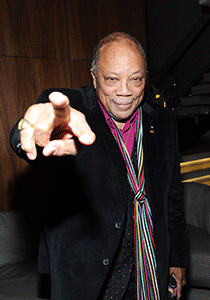WASHINGTON — The American Academy of Achievement is celebrating Black History Month by opening our archives and sharing the wisdom of America’s most storied musician and producer, Quincy Jones, on the WHAT IT TAKES podcast series. Hear how he got his start in music, the courage it took to create a career in segregated America, and what it takes to sustain 70+ years in the music business.
WHAT IT TAKES features interviews with influential figures who have shared their stories of perseverance and success at the American Academy of Achievement education leadership summits. During the month of February, we are highlighting some of the greatest African American legends.
“The Music Man”: Quincy Jones has adopted nearly every imaginable role in the music business. From stage performer, composer, arranger, conductor, instrumentalist, actor, record producer, to motion picture and television producer, and record company executive, he’s seen it all and as we hear, done it all too!
Here are some highlights:
[ As a kid ] “…we’d break into this armory at night, the weekends and at night, and we’d eat pie, lemon meringue pie and ice cream. And when we got too tired of eating it we’d start to play — throw it at each other, and whatever trouble you could get in, you know — just awful. One night we went and broke in another door, and I broke into this door, and there was a piano there. And I just walked around the room to see what was there first, and then hands kind of hit the keyboard. And I remembered from Chicago, next door when I was a kid, there was a little girl named Lucy that used to play piano. And from that moment on, when I touched those keys, I said, “This is it. I’m not going to do the other thing again. I’m going here.” That’s what happened.”
[On the road] “…we’d get to places like Texas. This is when every place had white and colored to wait in the bus stations and the water fountains all over America. You couldn’t stay in a white hotel anywhere. We played dances in New Orleans, and they’d have chairs straight down the middle of the thing with — chairs to go both ways, white on this side and that side. Other places in New Orleans — I mean in North Carolina and South Carolina — they’d have $2.50 and $3.50 general admission for the black people. White spectators were $1.50…. And they’d sit upstairs and drink and watch the black people dance, you know. Oh, it was unbelievable. We played juke joints, and people would get shot, and we’d go through Texas.
“We always had a white bus driver because we couldn’t stop at the restaurants, and sometimes we’d see effigies like black dummies hanging by nooses from the church steeples in Texas. Like, that’s pretty heavy, on the church steeple, and they’ve got a black dummy hung, which means, “Don’t stop. Don’t even think about coming here.” And the bus kept moving, you know. And then they’d finally get to places where we’d get the driver — the white driver would go in and get food for the band, and sometimes in Newport News we slept — I remember Jimmy Scott and I slept in a funeral parlor where the bodies were.”
Listen now on iTunes: https://apple.co/1NoyKo5
